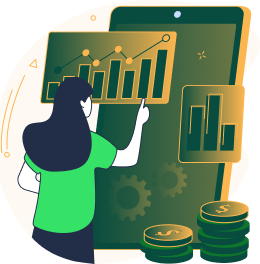Setting up a bank account in Australia is a breeze with major banks like CommBank, Westpac, NAB, and ANZ. You can open an account online up to a year before you get here and access debit cards and other services.
Just remember, banks usually have poor foreign currency transfer rates, so it’s better to use a specialist Money Services Business for better conversion rates.
You can transfer money to your account, but you’ll usually need to visit the bank in person and show your ID before you can use it, due to anti-money laundering laws. We suggest using services like OFX, Wise, or TORfx to transfer money into AUD.
While opening a bank account is pretty easy, getting a credit card might be tougher for expats. That said, banks like HSBC, CommBank, NAB, ANZ, and Westpac do offer credit cards to non-residents.
Can a foreigner open a bank account in Australia?
Yes! For the most part, it’s fairly simple and easy as long as you have all the required documents.
Australian banks also use the 100 point check, a government-adopted personal identification system. Different pieces of ID (such as a driver’s license, passport, tenancy agreement, utility account, etc.) are worth a certain number of points. You need to satisfy a minimum of 100 points total to open an account.
Required documents to open a bank account
- Date you plan on arriving in Australia
- Address of where you will be living
- Visa that you will be entering Australia
- Employment details
- Passport or another proof of identity
- 100 points worth of documentation when you arrive in Australia
You can usually open your account anywhere from three to twelve months before you get to Australia. Most banks require you to be at least 18, but Westpac and CommBank let younger customers apply.
If you wait until you’re in Australia to open your account and do it within six weeks of arriving, all you need is your passport. You can skip the 100 point ID check.
What's the difference between a bank and Money Services Business (MSB)?
A money services business (MSB) is any company, other than a bank, that helps you send, exchange, or convert money. Banks on the other hand offer broader financial services like loans, savings, and checking accounts.
MSBs are still financial institutions, so they have to follow the same rules as banks, like anti-money laundering laws, Know Your Customer (KYC) requirements, and due diligence procedures.
Which should I use?
Our recommendation is to start off by transferring your international currency into Australia Dollars using one of the Money Services Businesses (MSB) below. MSBs have the best currency conversion rates on the market and allow for the best transfer options. They offer physical cards and digital wallet options so you can tap to pay and withdraw from ATMs easily.
From there, open up an Australian bank account. This will be used for any money you earn or receive while in Australia, in AUD.
Which bank should I choose?
For expats unfamiliar with the Australian banking system, a financial planner can provide valuable guidance in selecting the right bank and financial products. Financial planners assess your individual needs, such as managing foreign income, transferring funds internationally, or opening accounts for investments or retirement planning. They can recommend banks and products that align with your financial goals, offer competitive fees, and provide services tailored to expats.
Additionally, a financial planner can help you navigate currency exchange options, set up efficient money transfers, and optimise your financial strategy for living and working in Australia. While their services come at a cost, the personalised advice can save you time and money in the long run, making it a worthwhile investment for many expats.
FAQ
Yes, many major Australian banks allow expats to open an account online up to 12 months before arrival, simplifying the transition.
Common options include everyday transaction accounts, savings accounts, and term deposits. Choose one that fits your financial needs.
Typically, you’ll need a passport, proof of address, and a Tax File Number (TFN) if you plan to work in Australia.
Some banks charge monthly fees, but these can often be waived if you meet specific conditions, such as depositing a minimum amount.
Yes, once your account is active, you can provide your employer with your account details for salary deposits.
A debit card uses your own money, while a credit card allows you to borrow funds up to a limit, with interest applied to balances not repaid.
No, but providing a TFN is recommended to avoid higher withholding tax on interest earned in your account.





